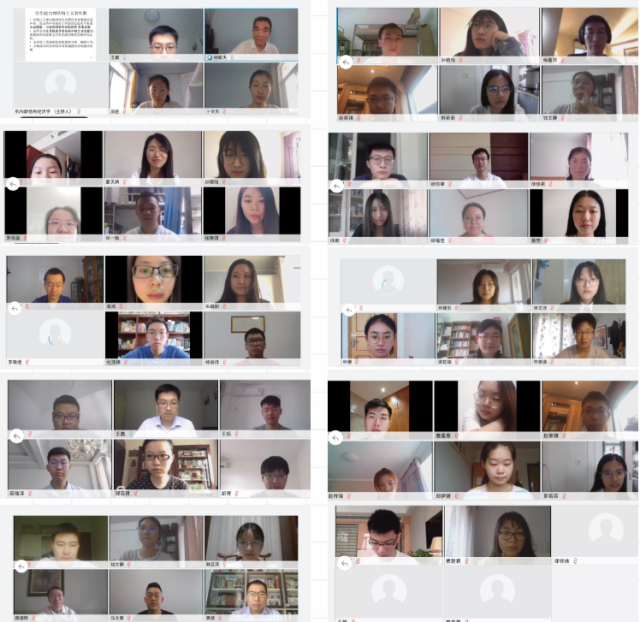Students﹀
7th NSE Summer School Successfully Concluded
2020-07-06
The Institute of New Structural Economics at Peking University (INSE) held its 7th Summer School online from July 1st to 3rd. This year’s program consisted of 1 keynote, 3 Q&A sessions, 6 lectures and admission interview session that allow 40 prospective students to get to know New Structural Economics (NSE) and its sub-fields,
Yong Wang, Associate Professor and Academic Deputy Dean of INSE, chaired the opening ceremony on July 1st. In his opening remarks, Professor Justin Yifu Lin, Dean of INSE, encouraged attending students to gain a fundamental insight of NSE research at Summer School, as NSE endeavors to achieve theoretical innovation by drawing lessons from the development experiences of China and other developing countries, and would greatly benefit the students in their future research and practice.

In his keynote themed New Structural Economics: A Structural Revolution to Neo-classical Economics, Professor Justin Yifu Lin explained the theoretical foundation of NSE, and argued how NSE, as a structural revolution approach to neo-classical economics, would possibly reshape future economics research. He also noted that NSE is a gold mine for theoretical innovation, and would empower developing countries to better “understand the world” and “change the world”. The keynote ended with a Q&A that further explored some of the points raised by students.
INSE faculty and think tank team members then joined a lively Q&A to explain INSE’s postgraduate program, academic research and so forth.
On July 1st afternoon, the faculty of INSE introduced various sub-fields of New Structural Economics academic research in five sessions. Yong Wang, Associate Professor at INSE, opened the Macro and Growth session with a presentation themed Industrial Upgrading and Economic Growth: from NSE Perspective; Lijun Zhu, Assistant Professor at INSE, briefly introduced his research in economic growth in developing countries; Shenzhe Jiang, Assistant Professor at INSE, shared his research findings in strategic government behavior and economic growth. Junjie Xia, Assistant Professor at INSE, concluded the session with a presentation on his research in macroeconomics from NSE perspective.
Mingzhi Xu, Assistant Professor at INSE, delivered a presentation themed Quantitative Method in NSE - When Reduced-form Reg Meets Structural Model: The Example of Accounting for Global Trade Pattern in the Trade and Regional Economics session.
In the following Finance and Development session, Jiajun Xu, Assistant Professor at INSE, introduced core research topics and research trends of New Structural Finance.
Dr. Caihui Fu, Director of the Research Center for Textbooks, Case Studies and Flagship Reports at INSE, shared his insight on NSE’s principles and axiomatization.
The following session focused on NSE’s application in other fields. Jie Zheng, Postdoctoral Researcher (textbook compilation track) at INSE, shared his insight on basic principle and framework of New Structural Environmental Economics. Huan Zhu, Postdoctoral Researcher at INSE, explained some characteristic facts of industrial sector structure from New Structural Environmental Economics perspective. Jianye Yan, Associate Professor at INSE, conclude the session with a presentation themed Supervision Intensity, Incentives and Policy Burden: Some Lessons from the Reform of Chinese State-Owned Enterprises.
The final session on July 1st focused on INSE’s policy practices. Dr. Jia Yu, Director of International Development and Cooperation Department, opened the session with an introduction of international think tank team’s GIFF framework in practice. Dr. Bin Huang, Director of The Domestic Think Tank Department, delivered a speech entitled Development Strategy in “14th Five-Year Plan” Era toward Quality Development: Based on NSE Methodology. The session concluded with Dr. Changzheng Liu, Senior Operations Expert and Director of Enterprise Development Department, who introduced the application of EIGP framework of New Structural Industrial Economics.
9 Peking University undergraduates, who recently enrolled in Justin Yifu Lin Class, also attended the sessions online.
On July 2nd and 3rd, 40 prospective students attended admission interviews and exchanged with INSE postgraduate students. The Summer School concluded after Yong Wang, Academic Deputy Dean of INSE and Jianye Yan, Director of Postgraduate Program further introduced NSE’s graduate program outline in the final Q&A.

